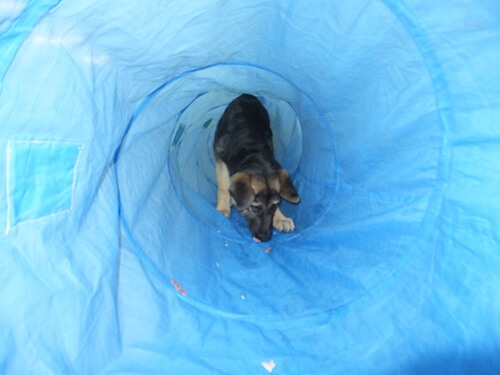Puppy Care
Your New Puppy
Congratulations on your new puppy! There is a lot of information to take in at this age, and this can be daunting. Listen below and see how top 10 things you need to know to get your pet off to the best start in life!
Vaccination
Vaccination provides your puppy with protection from a number of viral and bacterial diseases that may be life threatening. For infections such as parvovirus and hepatitis there are no cures once infected. We therefore recommend a C5 vaccination, which protects against parvovirus, canine infectious hepatitis, distemper virus, parainfluenza virus and Bordetella bronchiseptica (also known as the kennel cough). Puppies first receive protective antibodies when they drink colostrum, a special milk that is secreted by a vaccinated mother within the first twenty-four hours following birth. Unfortunately these antibodies are only present for some weeks, after which you puppy is susceptible to disease.

Intestinal worms
Hookworms, roundworms, whipworms and tapeworms build up in the intestines and are passed in your dog’s faeces. These worms can not only stunt the growth of your pet, but some can also be passed onto other pets and people in the house. Therefore deworming your puppy fortnightly between 2 weeks-3 months of age and then monthly between 3 and 6 months of age will minimize the chances of transmission. Give your pet a deworming treatment every 3 months from 6 months of age onwards.
Heartworm
Dogs become infected with heartworm following a bite from a mosquito carrying the parasite. After living in the skin the heartworm gradually migrates into the bloodstream and to the heart, where they live in the pulmonary arteries or in more severe infections, the heart itself. Heartworm can be prevented by a once yearly injection at the same time as vaccination; alternatively there are once monthly spot on preparations that also protect against fleas and mites. It is best to begin prevention between 8-12 weeks of age. If your dog is older than 6 months and not protected against heartworm it must be tested for the parasite before prevention can be commenced.
Fleas
Flea dermatitis is the most common skin-condition affecting pets. Itchiness and scratching can lead to hair loss and obvious inflammation of the skin. . If swallowed fleas can also result in infestation with the tapeworm. Cats and dogs are infected with the same flea species and so it is important all pets in the family are treated. Only a small number of fleas are required to produce an intense itching reaction. Many medications are now prepared to protect against fleas, mites and heartworm.
Desexing
Desexing involves removing the ovaries and uterus in females and the testes in males. Caroline Springs Veterinary Hospital recommends if you are not planning to breed with pets that you have them desexed. For females, desexing avoids unwanted litters, significantly reduces the chances of breast cancer, uterine infections and also ensures that the dog does not attract roaming males when in season. In males, desexing greatly reduces aggression towards other male dogs, territorial urination, mounting, hypersexual behaviours, roaming, prostate and testicular cancer. Desexing will not alter your dogs’ personality. We recommend desexing by 6 months of age.
Microchips
Microchipping is a quick procedure that allows pets to be identified by veterinary clinics and council authorities. It is now a legal requirement that all pets newly registered in Victoria are implanted with a microchip. Local pounds find many lost pets everyday and are able to get in contact with their owners due to the presence of a microchip.
Nutrition and Care
Exercise, training and good nutrition all contribute to the health of your puppy. Training dogs to sit, stay and come are vital to the safety of your pet and those around you. Dogs learn what you would like from them from a young age of about 8 weeks and so a reasonable amount of training and routine ensure you are able to communicate with your puppy. Practice consistency and be patient. Rewards can assist training but too much of the wrong types of food are not good for your puppy and can result in gastrointestinal and dental disease. There are many foods that come ready prepared with the correct amount of calories and micronutrients, one such food is Royal canin. For more information on appropriate food for your pet ask us at your next visit and ask about our fantastic training classes held indoors in a specific purpose built training room.
Please Contact Us to book an appointment.
